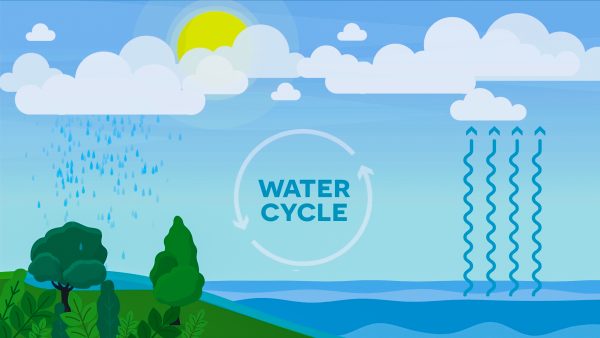Water Cycle Definition
The water cycle is the process of water evaporating and condensing on earth. For example, surface water evaporates, condenses into clouds, then rains down.
View Lesson on Water Cycle (3-5 Version)
Become a member to get full access to our entire library of learning videos, reading material, quiz games, simple DIY activities & more.
Become a member to get full access to our entire library of learning videos, quiz games, & more.
Plans & Pricingto watch this full video.

Access All Videos
and Lessons, No Limits.
Access All Videos

No credit card required,
takes 7 sec to signup.
No card required

Ready-to-go lessons
that save you time.
Ready-to-go lessons
If you are on a school computer or network, ask your tech person to whitelist these URLs:
*.wistia.com, fast.wistia.com, fast.wistia.net, embedwistia-a.akamaihd.net
Sometimes a simple refresh solves this issue. If you need further help, contact us.
Water Cycle (3-5 Version)
Fun Facts
- Water on Earth is millions of years old, constantly recycled.
- The water cycle is the continuous process of water moving around between air and land, driven by heat from the sun.
- Without the water cycle, there would be no life on Earth!
Why Do We Need To Know About Water Cycle
Learning about the water cycle helps you see why things like drying clothes outside and guessing the weather happen. When water turns from liquid to gas, called evaporation, it’s a big part of why we can dry clothes outside. This shows how the water cycle affects our everyday life.
The water cycle is also important for jobs like weather forecasting. Knowing how water moves in the air helps forecasters predict the weather. This knowledge is useful for planning our days and getting ready for things like snow. This shows the water cycle is important for both home and work.
Frequently Asked Questions
Check out the Full Lesson on Water Cycle (3-5 Version)
In this lesson, we learn that:
- Water on Earth is millions of years old and is constantly being recycled.
- Water vapor is constantly evaporating from the surface of the Earth.
- Water vapor in the air condenses to form clouds.
- Water falls back to earth and the cycle repeats.
Related Topics
- Adaptation Definition
- Amplitude Definition
- Balanced Force Definition
- Biodiversity Definition
- Carbon Dioxide Definition
- Carnivore Definition
- Condensation Definition
- Conservation Biologist Definition
- Definition Of Nutrients
- Definition Of Shade
- Digestive System Definition
- Distillation Definition
- Divergent Boundary Definition
- Earth’s Axis Definition
- Earth’s Rotation Definition
- Electromagnetic Radiation Definition
- Energy Conversion Definition
- Engineering Design Process Definition
- Evaporation Definition
- Exoskeleton Definition
- Freezing Definition
- Habitat Definition
- Hydrosphere Definition
- Invasive Species Definition
- Light Reflection Definition
- Magma Definition
- Magnetic Field Definition
- Magnetic Poles Definition
- Mitochondria Definition
- Moon Definition
- Motion Definition
- Multicellular Definition
- Muscular System Definition
- Mutualism Definition
- Newton’s 2nd Law Of Motion Definition
- Pull Definition
- Pulley Definition
- Renewable Energy Definition
- Star Definition
- States Of Matter Definition
- Synthetic Materials Definition
- Tectonic Plates Definition
- Thermometer Definition
- Tsunami Definition
- Unbalanced Force Definition
- Water Cycle Definition
- Water Distribution Definition
- Wave Definition
Start a Free Trial Today. Get a $5 Amazon Gift Card!
Teachers! Start a free trial & we'll send your gift card within 1 day. Only cards left. Try it now.
Select Grade
Select Subject
This email is associated with a Science Kit subscription. Kit subscriptions are managed on this separate page: Manage Subscription

-
Download InvoiceScience & Math$/yr
-
Download InvoiceScience Only$/yr

access all lessons
• No credit card required •
"My students loved the videos. I started the video subscription in May and used them as a review before the state test, which I know contributed to 100% of my class passing the state test."
Rhonda Fox 4th Grade Teacher, Ocala, Florida
• No credit card required •
"My students loved the videos. I started the video subscription in May and used them as a review before the state test, which I know contributed to 100% of my class passing the state test."
Rhonda Fox 4th Grade Teacher, Ocala, Florida
• No credit card required •
Already a member? Sign In
* no credit card required *

* no credit card required *
* no credit card required *


no credit card required
Skip, I will use a 3 day free trial
Enjoy your free 30 days trial
-
Unlimited access to our full library
of videos & lessons for grades K-5. -
You won’t be billed unless you keep your
account open past your 14-day free trial. -
You can cancel anytime in 1 click on the
manage account page or by emailing us.
-
Unlimited access to our full library of videos & lessons for grades K-5.
-
You won't be billed unless you keep your account open past 14 days.
-
You can cancel anytime in 1-click on the manage account page.
Cancel anytime in 1-click on the manage account page before the trial ends and you won't be charged.
Otherwise you will pay just $10 CAD/month for the service as long as your account is open.
Cancel anytime on the manage account page in 1-click and you won't be charged.
Otherwise you will pay $10 CAD/month for the service as long as your account is open.
We just sent you a confirmation email. Enjoy!
DoneWe use cookies to make your experience with this site better. By using this site you agree to our use of cookies. Click "Decline" to delete and block any non-essential cookies for this site on this specific property, device, and browser. Please read our privacy policy for more information on the cookies we use.Learn More
We use cookies to improve your experience. By using this site, you agree to our use of cookies. Click "Decline" to block non-essential cookies. See our privacy policy for details.Learn More



























































































































